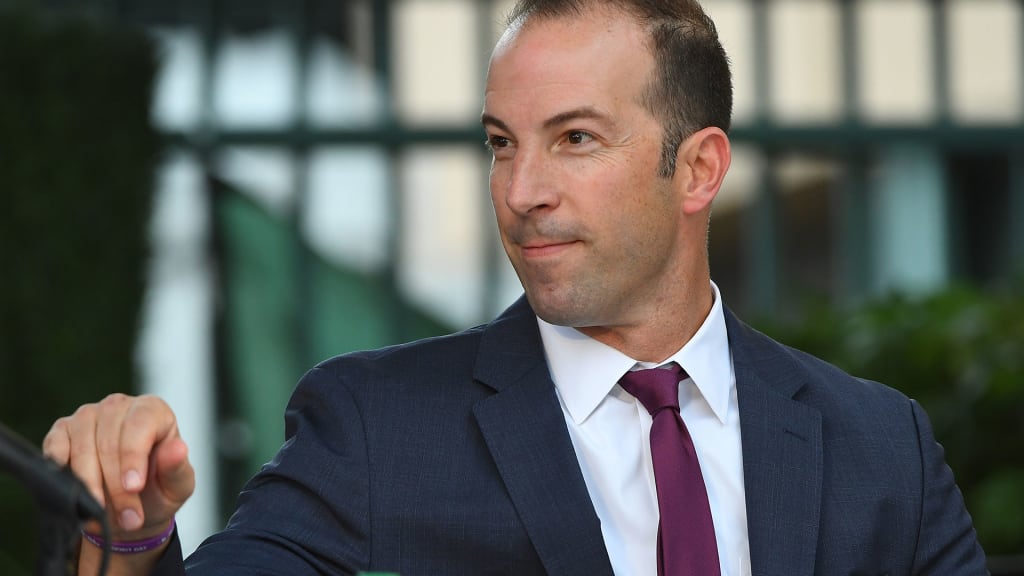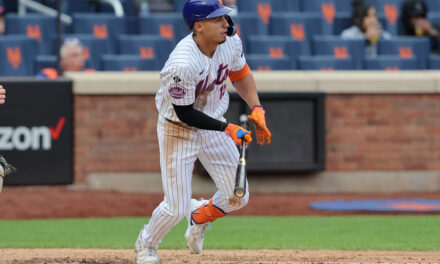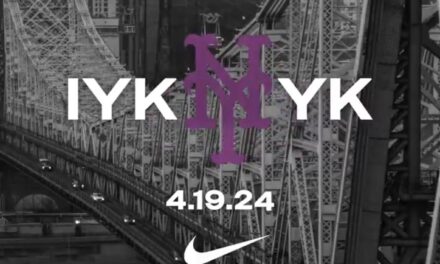
New York Mets general manager Billy Eppler has given his insight on what his team did at the 2022 MLB trade deadline after what proved to be ultimately a quiet day in Queens on Tuesday.
Having acquired DH Daniel Vogelbach and catcher Michael Perez from the Pirates in late July, in addition to OF Tyler Naquin from the Reds, Eppler made two more deals just before the deadline. He sent J.D. Davis and three prospects to the San Francisco Giants for another bat in Darin Ruff, before acquiring veteran reliever Mychal Givens from the Cubs for minor league pitcher Saúl González.
On a day where the San Diego Padres acquired superstar slugger Juan Soto in a historic deal, the Yankees got considerably better and other contenders made big moves, there was a general school of thought that the Mets missed an opportunity to reload and become a better ball club. Look at any winners and losers list from the trade deadline today and the Mets are likely to fall in the latter category.
However, while they failed to make a big splash that would ultimately move the needle, the Mets did make subtle improvements to the big league roster. Ruff is a hitter who can absolutely mash against lefties while Givens is having a fine year with a 2.66 ERA and he’s currently riding a streak of 15 straight scoreless appearances. And, speaking on a Zoom call after the deadline, Eppler said he was satisfied with how the Mets handled their business.
“Through the whole trade deadline and I’d say over the last 72 hours we’ve been touching base with a lot of different clubs,” Eppler said. “We got ourselves to a point where we were able to execute some things that we wanted to do. Through the whole process we talked about growing that run differential a little bit and if it yielded itself as more production offensively and scoring more, we were going to be open to that. And, if it yielded an opportunity to prevent more runs, we would be open to that too. I actually think both things were satisfied so we were able to grow that run differential and strengthen our club today. It was all in all a positive day.”
"We just couldn't get the price point to an area where we thought that was reasonable for us to do"
Billy Eppler explains why the Mets didn't add a left-handed reliever at the trade deadline: pic.twitter.com/xNqm5YbNnj
— SNY Mets (@SNY_Mets) August 2, 2022
That being said, the Mets failed to address a couple of glaring holes. While they did bolster the bullpen with Givens, they failed to acquire a lefty reliever. Having given up three prospects as part of the deal for Ruff – while the Phillies gave up just one in pitcher Ben Brown to acquire reliever David Robertson from the Cubs – it felt as though the Mets were too conservative when it came to making the big moves that really would have made this team a whole lot better. Eppler, though, wasn’t prepared to sacrifice the long-term future for the present.
“We actually did come close in the left-handed market,” Eppler said. “I just couldn’t get the price point to an area where we felt it was reasonable for us to do given where we were in the season and what we were going to have to yield to do that. That just felt like it was a little strong for us. We have some options internally to potentially look at as we get a little closer to the end of the season, but we also know that Joely (Rodriguez) has some track record and we feel comfortable about him being able to get back to being the best version of himself. Getting out there (on Tuesday) and having a scoreless inning was a step in the right direction. We have a lot of faith in our staff to get him back to where he was earlier in the year for us. These things have a way of working themselves out so there’s some options internally.”
Not only were the Mets unwilling to pay a high price to acquire a lefty reliever, but they also failed to obtain another power bat in order to inject some needed pop into the middle of the lineup. The Mets were believed to be in on both Cubs catcher Willson Contreras and Red Sox designated hitter J.D. Martinez but, come the deadline, both of those players ended up remaining where they were. And, once again, Eppler spoke about the organization being committed to not giving up the farm to win now and risking future successes.
“There was a lot of inquiries (for the Mets’ top prospects) but one of the things we’ve talked about here is just really trying to maintain that organizational discipline to kind of crush any urge to make a snap or impulsive decision and give up large amounts of future World Series odds or expectation in exchange for just some marginal gains right now,” Eppler said. “Some of that undisciplined thinking can lead to years of mediocrity and doing the same thing over and over and over again. We were really happy to be able to put Vogelbach and Ruff together and I’m sure all of you have done the work and looked at the splits and everything of that nature. We feel we’ve been able to add, using two roster spots, an impact bat for us to be able to utilize and we were able to do everything that we wanted to do and stay outside of our top 19 prospects.
“We were able to strengthen the club (on Tuesday) and over the last few weeks, so we feel good about how that transpired.”
Eppler also revealed that the Mets were close to potentially acquiring a catcher at one point close to the deadline but, again, the front office decided that the price being asked for in return just wasn’t worth what they would be getting back. However, Eppler also shot down the prospect of stud phenom Francisco Alvarez being called up to the majors any time soon.
“I felt we were a little bit close but (on Tuesday) some things kind of drifted apart and we weren’t going to try and chase it down and do something that we would regret,” Eppler said. We’ll get James (McCann) back here shortly and that will reinforce the position, and we also have a young kid that all of you have asked me about individually and pulled me aside, but I don’t think he’s at a point where he will factor in right now.”
One final interesting nugget was Eppler’s insistence on building sustainability and not going all in now by giving up the farm. It appears as though the entire franchise, from ownership down, is committed to the slow build and what Eppler said below may well hint as to what this team does going forward when it comes to its prospects.
“We understand what our odds look like,” Eppler said. “We can factor in different types of acquisitions and see how that changes, but what we can also do is factor in the players we’re yielding and through the forecast and some of the predictive modeling that we’re able to do, we can look and see what does that subtract to in the future and how many years does that subtract out to in the future. If you’re subtracting a percent or a percentage and a half aggregate over a four or five-year period to move up one percent now, I don’t think that’s how sustainability is built. That has been an objective of mine and Steve’s (Cohen) and Sandy’s (Alderson) as we were putting this whole thing together. We want to do everything in service to that sustainability, so that’s how we measure that. Nothing presented itself that didn’t take too much of that future away.”














